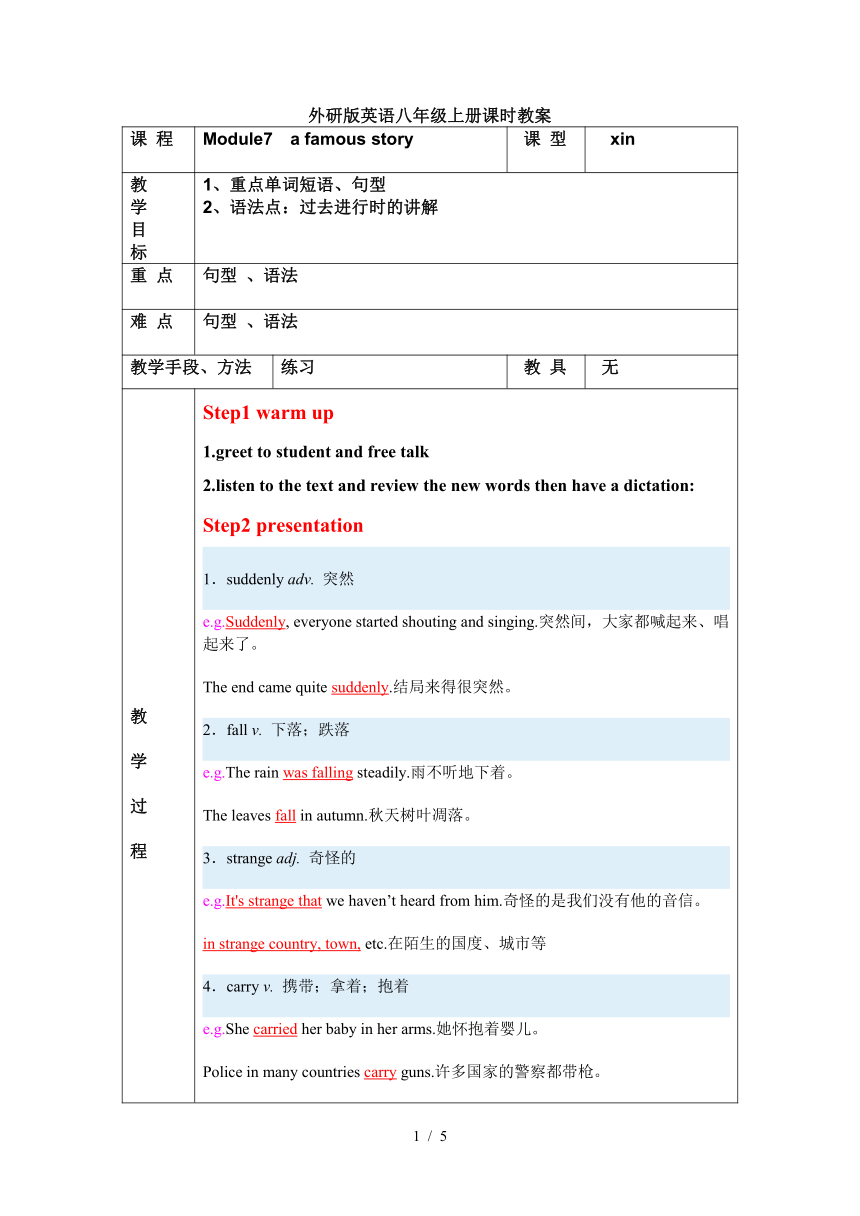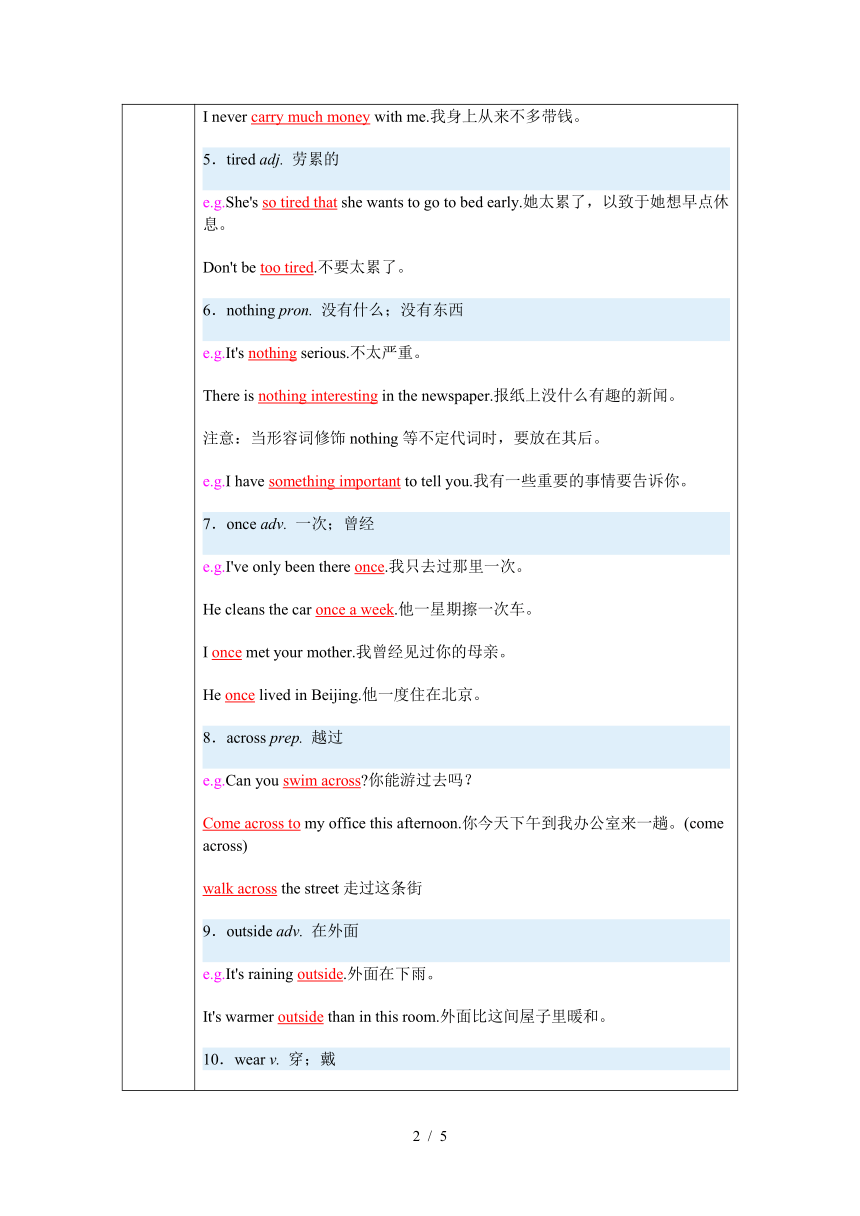外研版英语八年级上册Module 7 A famous story复习教案
文档属性
| 名称 | 外研版英语八年级上册Module 7 A famous story复习教案 |  | |
| 格式 | zip | ||
| 文件大小 | 39.0KB | ||
| 资源类型 | 教案 | ||
| 版本资源 | 外研版 | ||
| 科目 | 英语 | ||
| 更新时间 | 2021-02-15 10:58:58 | ||
图片预览


文档简介
外研版英语八年级上册课时教案
课
程
Module7
a
famous
story
课
型
xin
教学目标
1、重点单词短语、句型2、语法点:过去进行时的讲解
重
点
句型
、语法
难
点
句型
、语法
教学手段、方法
练习
教
具
无
教学过程
Step1
warm
up1.greet
to
student
and
free
talk
2.listen
to
the
text
and
review
the
new
words
then
have
a
dictation:Step2
presentation1.suddenly
adv.
突然e.g.Suddenly,
everyone
started
shouting
and
singing.突然间,大家都喊起来、唱起来了。The
end
came
quite
suddenly.结局来得很突然。2.fall
v.
下落;跌落e.g.The
rain
was
falling
steadily.雨不听地下着。The
leaves
fall
in
autumn.秋天树叶凋落。3.strange
adj.
奇怪的e.g.It's
strange
that
we
haven’t
heard
from
him.奇怪的是我们没有他的音信。in
strange
country,
town,
etc.在陌生的国度、城市等4.carry
v.
携带;拿着;抱着e.g.She
carried
her
baby
in
her
arms.她怀抱着婴儿。Police
in
many
countries
carry
guns.许多国家的警察都带枪。I
never
carry
much
money
with
me.我身上从来不多带钱。5.tired
adj.
劳累的e.g.She's
so
tired
that
she
wants
to
go
to
bed
early.她太累了,以致于她想早点休息。Don't
be
too
tired.不要太累了。6.nothing
pron.
没有什么;没有东西e.g.It's
nothing
serious.不太严重。There
is
nothing
interesting
in
the
newspaper.报纸上没什么有趣的新闻。注意:当形容词修饰nothing等不定代词时,要放在其后。e.g.I
have
something
important
to
tell
you.我有一些重要的事情要告诉你。7.once
adv.
一次;曾经e.g.I've
only
been
there
once.我只去过那里一次。He
cleans
the
car
once
a
week.他一星期擦一次车。I
once
met
your
mother.我曾经见过你的母亲。He
once
lived
in
Beijing.他一度住在北京。8.across
prep.
越过e.g.Can
you
swim
across?你能游过去吗?Come
across
to
my
office
this
afternoon.你今天下午到我办公室来一趟。(come
across)walk
across
the
street走过这条街9.outside
adv.
在外面e.g.It's
raining
outside.外面在下雨。It's
warmer
outside
than
in
this
room.外面比这间屋子里暖和。10.wear
v.
穿;戴e.g.wear
a
coat,
hat,
ring,
watch,
etc.穿大衣、戴帽子、戴戒指、戴手表等She
was
wearing
sun-glasses.她戴着墨镜。She
never
wears
green.她从来不穿绿色的衣服。11.perform
v.
表演;施行e.g.perform
a
task,
one's
duty执行任务、履行义务They
are
performing
his
piano
concerto
tonight.他们今晚演出他的钢琴协奏曲。12.stop
v.
停止;停下e.g.Please
stop
talking.不要讲话了。Please
stop
to
have
a
rest.请停下来休息一下。注意:stop
doing
sth.和stop
to
do
sth.的用法和区别。13.go
off(灯)熄灭;停(电)e.g.Suddenly,
the
light
went
off.突然停电了。14.Once
or
twice
she
looked
into
her
sister’s
book,
but
it
had
no
pictures
or
conversations
in
it.[译文]她看了几眼姐姐的书,发现书上既没有插图又没有对话。once
or
twice
意思是“几次,一两次”。例如:She
goes
swimming
once
or
twice
a
month.她一个月去游一两次泳。15.“And
what
is
a
book
for,”
thought
Alice,
“without
pictures
or
conversations?”What…for?表示“为什么……?”例如:—I’m
going
to
Paris? 我要去巴黎。—What
for?(=What
are
you
going
to
Paris
for?) 去做什么?16.So
she
was
thinking
of
making
a
daisy
chain
when
suddenly
a
white
rabbit
with
pink
eyes
ran
by
her.[译文]她正在想着做一个雏菊花环,突然,一只粉色眼睛的小白兔从她身边跑过。be
doing…when…表示一个动作在进行,另一个动作又发生了。例如:They
were
working
in
the
fields
when
it
began
to
rain.他们正在田里干活,这时天开始下起雨来。daisy
chain是西方孩子们用雏菊梗和花编成的一个圈,可戴在头上、挂在颈上或墙上。四、语法点拨:过去进行时1.过去进行时的定义过去进行时常表示过去某一时刻或过去某一阶段内正在进行的动作。2.过去进行时的构成过去进行时是由“be动词的过去式was/were+现在分词”构成。3.过去进行时的基本句型肯定式疑问式否定式I
was
workingWere
you
working?I
was
not
workingHe/She/it
was
working.Was
he/she/it
working?Yes,
he/she/it
was.No,
he/she/it
wasn’t.He/she/it
was
not
working.We
were
working.Were
we
working?We
were
not
workingYou
were
workingWere
you
working?You
were
not
workingThey
were
workingWere
they
working?They
were
not
working4.过去进行时的基本用法(1)过去进行时表示过去某一段时间或某一时刻正在进行的动作。常与之连用的时间状语有,at
that
time/moment,
(at)
this
time
yesterday
(last
night/Sunday/week…),
at+点钟+yesterday
(last
night
/
Sunday…),when
sb.
did
sth等时间状语从句。What
were
you
doing
at
seven
p.m.
yesterday?
昨天晚上七点你在干什么?I
first
met
Mary
three
years
ago.
She
was
working
at
a
radio
shop
at
the
time.
我第一次遇到玛丽是在三年前,当时她在一家无线电商店工作。I
was
cooking
when
she
knocked
at
the
door.
她敲门时我正在做饭。(2)过去进行时可与soon,
the
next
moment,
in
minutes,
minutes
later等时间状语连用,表示一个新的动作刚刚开始。如:Soon
the
whole
town
was
talking
about
it.
不久镇上的人就都谈论起这种事了。(3)一般过去时往往表示某一动作已经完成,而过去进行时却表示动作在持续或未完成。如:I
saw
you
while
you
were
speaking
to
the
teacher.
你在和老师谈话时我看见了你。注意:有的过去时间状语既可用于一般过去时,也可用于过去进行时,但含义不同。如:She
wrote
a
letter
to
her
friend
last
night.
她昨晚给她的朋友写了封信。(信写完了)She
was
writing
a
letter
to
her
friend
last
night.她昨晚一直在给她的朋友写信。(信不一定写完)四、《左讲右练》上的综合练习题
学生掌握情况知识反馈:
领导审阅
自我评价:
PAGE
/
NUMPAGES
课
程
Module7
a
famous
story
课
型
xin
教学目标
1、重点单词短语、句型2、语法点:过去进行时的讲解
重
点
句型
、语法
难
点
句型
、语法
教学手段、方法
练习
教
具
无
教学过程
Step1
warm
up1.greet
to
student
and
free
talk
2.listen
to
the
text
and
review
the
new
words
then
have
a
dictation:Step2
presentation1.suddenly
adv.
突然e.g.Suddenly,
everyone
started
shouting
and
singing.突然间,大家都喊起来、唱起来了。The
end
came
quite
suddenly.结局来得很突然。2.fall
v.
下落;跌落e.g.The
rain
was
falling
steadily.雨不听地下着。The
leaves
fall
in
autumn.秋天树叶凋落。3.strange
adj.
奇怪的e.g.It's
strange
that
we
haven’t
heard
from
him.奇怪的是我们没有他的音信。in
strange
country,
town,
etc.在陌生的国度、城市等4.carry
v.
携带;拿着;抱着e.g.She
carried
her
baby
in
her
arms.她怀抱着婴儿。Police
in
many
countries
carry
guns.许多国家的警察都带枪。I
never
carry
much
money
with
me.我身上从来不多带钱。5.tired
adj.
劳累的e.g.She's
so
tired
that
she
wants
to
go
to
bed
early.她太累了,以致于她想早点休息。Don't
be
too
tired.不要太累了。6.nothing
pron.
没有什么;没有东西e.g.It's
nothing
serious.不太严重。There
is
nothing
interesting
in
the
newspaper.报纸上没什么有趣的新闻。注意:当形容词修饰nothing等不定代词时,要放在其后。e.g.I
have
something
important
to
tell
you.我有一些重要的事情要告诉你。7.once
adv.
一次;曾经e.g.I've
only
been
there
once.我只去过那里一次。He
cleans
the
car
once
a
week.他一星期擦一次车。I
once
met
your
mother.我曾经见过你的母亲。He
once
lived
in
Beijing.他一度住在北京。8.across
prep.
越过e.g.Can
you
swim
across?你能游过去吗?Come
across
to
my
office
this
afternoon.你今天下午到我办公室来一趟。(come
across)walk
across
the
street走过这条街9.outside
adv.
在外面e.g.It's
raining
outside.外面在下雨。It's
warmer
outside
than
in
this
room.外面比这间屋子里暖和。10.wear
v.
穿;戴e.g.wear
a
coat,
hat,
ring,
watch,
etc.穿大衣、戴帽子、戴戒指、戴手表等She
was
wearing
sun-glasses.她戴着墨镜。She
never
wears
green.她从来不穿绿色的衣服。11.perform
v.
表演;施行e.g.perform
a
task,
one's
duty执行任务、履行义务They
are
performing
his
piano
concerto
tonight.他们今晚演出他的钢琴协奏曲。12.stop
v.
停止;停下e.g.Please
stop
talking.不要讲话了。Please
stop
to
have
a
rest.请停下来休息一下。注意:stop
doing
sth.和stop
to
do
sth.的用法和区别。13.go
off(灯)熄灭;停(电)e.g.Suddenly,
the
light
went
off.突然停电了。14.Once
or
twice
she
looked
into
her
sister’s
book,
but
it
had
no
pictures
or
conversations
in
it.[译文]她看了几眼姐姐的书,发现书上既没有插图又没有对话。once
or
twice
意思是“几次,一两次”。例如:She
goes
swimming
once
or
twice
a
month.她一个月去游一两次泳。15.“And
what
is
a
book
for,”
thought
Alice,
“without
pictures
or
conversations?”What…for?表示“为什么……?”例如:—I’m
going
to
Paris? 我要去巴黎。—What
for?(=What
are
you
going
to
Paris
for?) 去做什么?16.So
she
was
thinking
of
making
a
daisy
chain
when
suddenly
a
white
rabbit
with
pink
eyes
ran
by
her.[译文]她正在想着做一个雏菊花环,突然,一只粉色眼睛的小白兔从她身边跑过。be
doing…when…表示一个动作在进行,另一个动作又发生了。例如:They
were
working
in
the
fields
when
it
began
to
rain.他们正在田里干活,这时天开始下起雨来。daisy
chain是西方孩子们用雏菊梗和花编成的一个圈,可戴在头上、挂在颈上或墙上。四、语法点拨:过去进行时1.过去进行时的定义过去进行时常表示过去某一时刻或过去某一阶段内正在进行的动作。2.过去进行时的构成过去进行时是由“be动词的过去式was/were+现在分词”构成。3.过去进行时的基本句型肯定式疑问式否定式I
was
workingWere
you
working?I
was
not
workingHe/She/it
was
working.Was
he/she/it
working?Yes,
he/she/it
was.No,
he/she/it
wasn’t.He/she/it
was
not
working.We
were
working.Were
we
working?We
were
not
workingYou
were
workingWere
you
working?You
were
not
workingThey
were
workingWere
they
working?They
were
not
working4.过去进行时的基本用法(1)过去进行时表示过去某一段时间或某一时刻正在进行的动作。常与之连用的时间状语有,at
that
time/moment,
(at)
this
time
yesterday
(last
night/Sunday/week…),
at+点钟+yesterday
(last
night
/
Sunday…),when
sb.
did
sth等时间状语从句。What
were
you
doing
at
seven
p.m.
yesterday?
昨天晚上七点你在干什么?I
first
met
Mary
three
years
ago.
She
was
working
at
a
radio
shop
at
the
time.
我第一次遇到玛丽是在三年前,当时她在一家无线电商店工作。I
was
cooking
when
she
knocked
at
the
door.
她敲门时我正在做饭。(2)过去进行时可与soon,
the
next
moment,
in
minutes,
minutes
later等时间状语连用,表示一个新的动作刚刚开始。如:Soon
the
whole
town
was
talking
about
it.
不久镇上的人就都谈论起这种事了。(3)一般过去时往往表示某一动作已经完成,而过去进行时却表示动作在持续或未完成。如:I
saw
you
while
you
were
speaking
to
the
teacher.
你在和老师谈话时我看见了你。注意:有的过去时间状语既可用于一般过去时,也可用于过去进行时,但含义不同。如:She
wrote
a
letter
to
her
friend
last
night.
她昨晚给她的朋友写了封信。(信写完了)She
was
writing
a
letter
to
her
friend
last
night.她昨晚一直在给她的朋友写信。(信不一定写完)四、《左讲右练》上的综合练习题
学生掌握情况知识反馈:
领导审阅
自我评价:
PAGE
/
NUMPAGES
同课章节目录
- Module 1 How to learn English
- Unit 1 Let's try to speak English as much as possi
- Unit 2 You should smile at her.
- Unit 3 Language in use .
- Module 2 My home town and my country
- Unit 1 It's taller than many other buildings.
- Unit 2 Cambridge is a beautiful city in the east o
- Unit 3 Language in use .
- Module 3 Sports.
- Unit 1 Nothing is more exciting than playing tenni
- Unit 2 This year we training more carefully.
- Unit 3 Language in use .
- Module 4 Planes, ships and trains .
- Unit 1 He lives the farthest from school.
- Unit 2 What is the best way to travel.
- Unit 3 Language in use .
- Module 5 Lao She Teahouse.
- Unit 1 I wanted to see the Beijing Opera.
- Unit 2 It descibes the changes in Chinese society.
- Unit 3 Language in use .
- Module 6 Animals in danger.
- Unit 1 It allows people to get closer to them .
- Unit 2 The WWF is working hard to save them all.
- Unit 3 Language in use .
- Revision module A
- Module 7 A famous story
- Unit 1 Alice was sitting with her sister by the ri
- Unit 2 She was thinking about her cat.
- Unit 3 Language in use .
- Module 8 Accidents
- Unit 1 While the car were changing to red, a car s
- Unit 2 I was trying to pick it up when it bite me
- Unit 3 Language in use .
- Module 9 Population
- Unit 1 The population of China is about 1.37 billi
- Unit 2 Arnwick was a city with 200,000 people.
- Unit 3 Language in use .
- Module 10 The weathe
- Unit 1 It might snow.
- Unit 2 The weather is fine all year round.
- Unit 3 Language in use .
- Module 11 Way of life
- Unit 1 In China ,we open a gift later.
- Unit 2 In England, you usually drink tea with milk
- Unit 3 Language in use .
- Module 12 Help
- Unit 1 What should we do before help arrives?
- Unit 2 Stay away from windows and heavy furniture.
- Unit 3 Language in use .
- Revision module B
